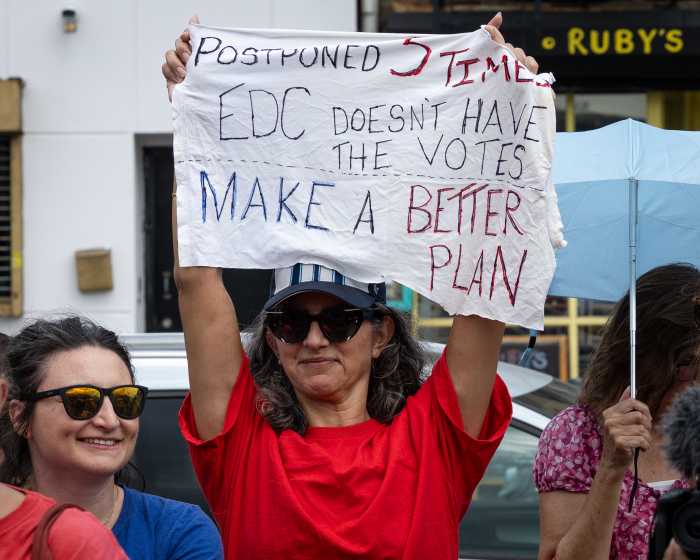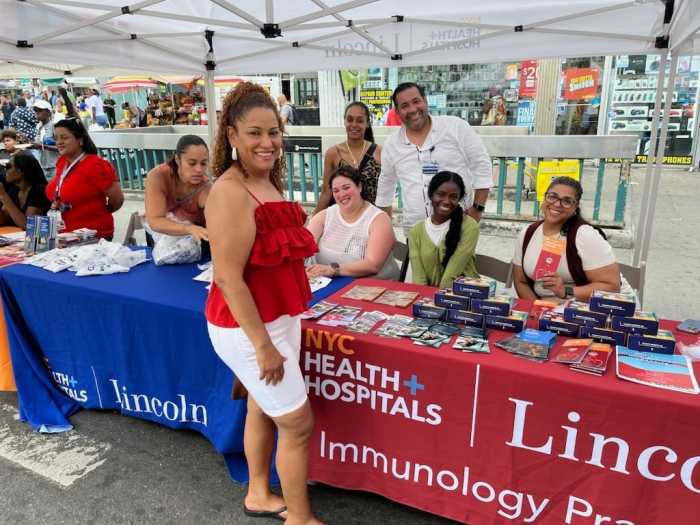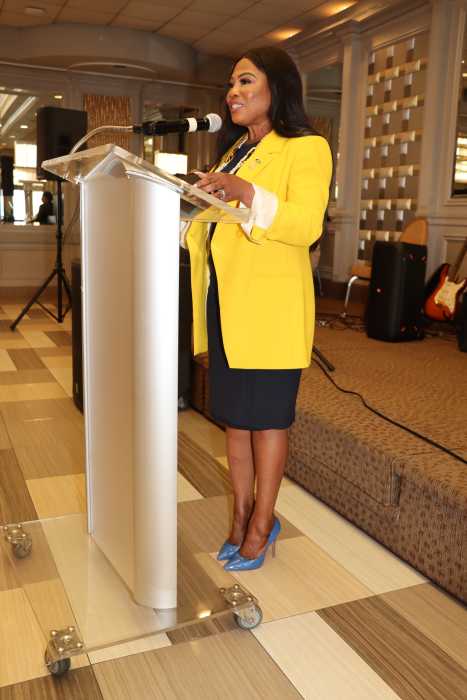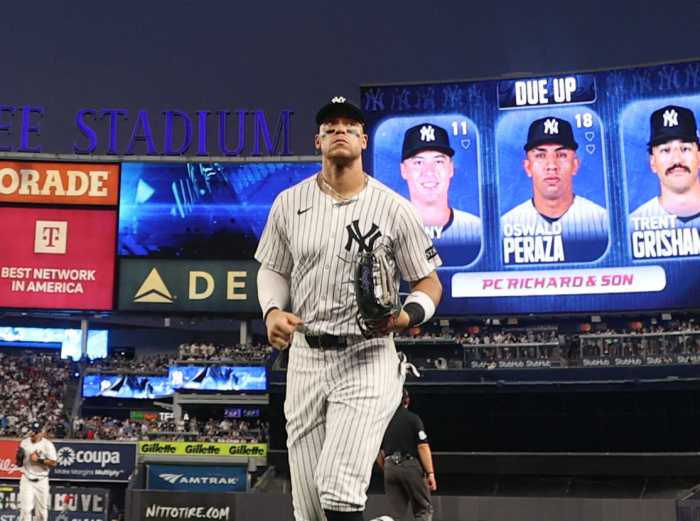Gay AG candidate scores another contested LGBT club win, but Cuomo enjoys advantages
With a decisive victory last Thursday evening in the balloting for the endorsement of the Stonewall Democratic Club of New York City, Sean Patrick Maloney, an out gay candidate for state attorney general, completed a successful streak of winning the most highly contested races among the city’s LGBT political organizations.
In contrast, Andrew Cuomo, who remains the clear frontrunner for the Democratic AG nomination in the September 12 primary, has snagged the lion’s share of endorsements from gay and lesbian elected officials.
Mark Green, the former city public advocate and unsuccessful 2001 Democratic mayoral nominee, who has consistently held the number two spot in the primary race, has had the most difficulty gaining traction, with either the political clubs or elected officials within the community—which is surprising given his longtime advocacy of gay rights and his past success in winning endorsements.
The June 8 win at Stonewall by Maloney, who served President Bill Clinton during his second term as the White House staff secretary, comes a month after his endorsement by the Lambda Independent Democrats, a gay club active in Brooklyn since the 1970s. In mid-April, he also won the support of the Empire State Pride Agenda, the bipartisan state LGBT lobbying group. The Out People of Color Political Action Club, a group that is formally nonpartisan, endorsed Maloney last month as well.
The Gay and Lesbian Victory Fund, a Washington-based group that works to elect gay and lesbian candidates nationwide, has supported Maloney’s campaign for the past year.
In contrast with Maloney, Cuomo, who also served Clinton, as his housing secretary, has secured his strongest gay backing from elected officials, including City Council Speaker Christine Quinn, state Senator Tom Duane, and City Councilwoman Rosie Mendez. When her AG favorite and state Assembly colleague Richard Brodsky dropped out of the race, Deborah Glick also threw her support to Cuomo. Emily Giske, a lobbyist who also serves as a vice chair of the State Democratic Party, supports Cuomo as well. The Gay and Lesbian Independent Democrats (GLID), a long established club where Quinn, Duane, and Giske have wielded considerable influence for more than a decade, is the former housing secretary’s leading LGBT club endorsement.
Another big endorsement Cuomo scored recently was that of former Mayor Ed Koch. At a Stonewall meeting in January, Cuomo was grilled about a long-simmering controversy involving posters that popped up during the 1977 mayoral primary between his father, the then-future governor, and Koch that read, “Vote for Cuomo, Not the Homo.” A Daily News report of the Stonewall meeting suggested, incorrectly, that the younger Cuomo questioned whether the anti-gay postering ever took place, to which the former mayor shot back, “It either means he has amnesia or is deliberately distorting the truth.” Though Koch has apparently gotten over his pique at Cuomo, he did say in making his endorsement that the AG candidate “has come a long way” since he served as a 19-year-old adviser to his father’s mayoral campaign.
Maloney, as he begins a roughly one-month effort to secure the petition signatures needed to win a spot on the September ballot, clearly hopes to use his club endorsements to speak over the heads of gay elected officials directly to LGBT voters.
He is not without high profile gay and lesbian endorsements, however. Two weeks ago, Maloney announced the support of Karen Burstein, a former judge and state senator who staged an upset victory in 1994 over incumbent Attorney General G. Oliver Koppell to win the Democratic nomination, only to lose in a close race to Republican Dennis Vacco in November.
David Mixner, a longtime activist who was one of President Clinton’s earliest and most visible gay supporters, is also supporting Maloney, as is Judy Shepard, the mother of Matthew Shepard, the Wyoming college student murdered in a grisly 1998 hate attack. Maloney has provided pro bono legal services to the Shepard family.
Green, the consumer rights attorney whose public involvement with gay rights and AIDS treatment causes dates back at least 20 years, has so far shown the least success in rallying LGBT support. His third place showing last week at Stonewall came despite a personal appeal made that evening by Ethan Geto, a gay rights advocate since the 1970s whose most recent high visibility political role was running the Howard Dean presidential campaign in New York State.
To date, Green has only won the endorsement of the Lesbian and Gay Democratic Club of Queens, a smaller group than Stonewall, GLID, or Lambda. The Jim Owles Liberal Democratic Club, founded in the past couple of years by Allen Roskoff, who served as LGBT liaison for Green when was public advocate and a mayoral candidate, has not yet made an endorsement, according to a Green campaign spokesman.
It remains to be seen, beyond the petitioning effort—which three of the four candidates must go through, after the state party convention last month decided to designate only Cuomo to be on the ballot—what impact the LGBT clubs’ and gay elected officials’ endorsements will have in a race where there has not been significant movement in the polls through the first five months of the year. Cuomo remains the frontrunner, though by how much is unclear. Just before the Democratic convention at the end of May, a Zogby poll put him up 28 to 26 percent over Green, with the other candidates lagging behind and a full third of respondents undecided. A NY1/Newsday poll last week gave Cuomo a much clearer lead, with 34 percent to Green’s 20 percent. In both match-ups, the margin of error was about four percent, and Maloney and Charlie King, a non-profit housing executive who also has a long record of support for gay rights, both were held to single digits.
Maloney supporters point out that the current polls reflect more than anything else name recognition—pointing especially to the arc of Burstein’s support growing through the summer of 1994—and that with the early summer petitioning and the trimming down of the field of candidates, voters will begin to focus on the choices they have in September. Denise O’Donnell, the former U.S. prosecutor in Buffalo, dropped out of the race a week and a half ago, a factor not yet measured by any poll.
As for name recognition, the Zogby poll in late May suggests that Cuomo, in fact, enjoys the greatest name recognition, at 84 percent, followed by Green at 64 percent. Both of these candidates, however, are generally well liked by those who know them, with each enjoying a two times or better ratio of favorability versus unfavorability. Whether Maloney or King will have the opportunity between now and September to become as well known as the leaders in the race and make as good an impression is unknown, and will likely depend on their opportunities to debate their opponents and the degree to which the AG race attracts media attention, especially in light of what Nassau County Executive Thomas Suozzi hopes will be a spirited primary contest between him and front-running gubernatorial candidate Eliot Spitzer, the current attorney general.
The value of the Democratic nomination for attorney general is also borne out in the current polls. In both the Zogby and the NY1/Newsday tallies, both Cuomo and Green hold double digit leads over the likely Republican candidate Jeanine Pirro, the former Westchester district attorney. That early handicapping suggests that Pirro, who famously misfired in her earlier intention to challenge Senator Hillary Rodham Clinton this year, may be having trouble establishing the rationale for her AG candidacy as well.
gaycitynews.com




































